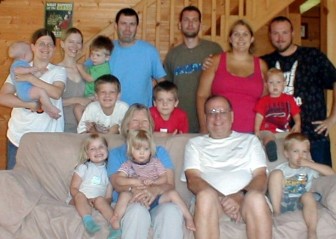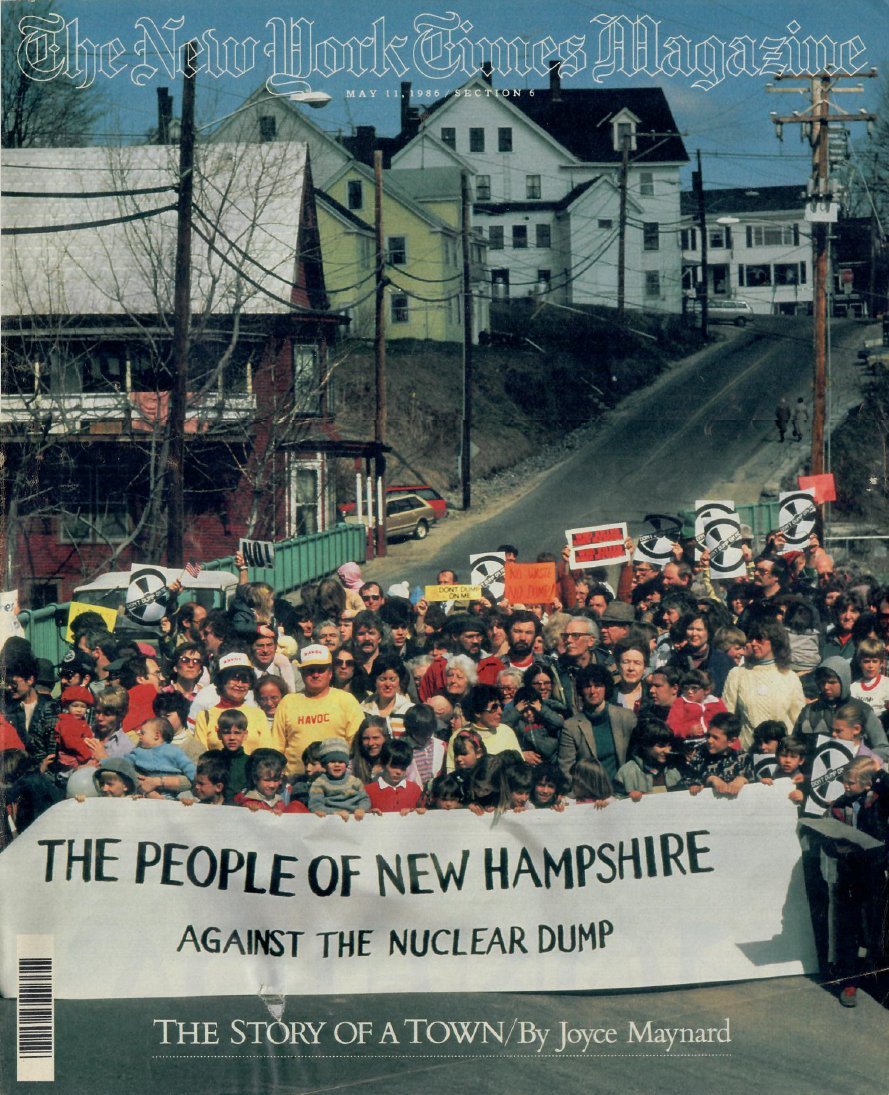
Front row from left to right: Faith Daley, Barbara Daley with Joy Daley on her lap, Phil Daley, Ryan Philibert. Back row left: Heather Daley holding Jeremiah Daley, Cinnamon Bloss holding Coleman Bloss Daley, Ben Daley, Jon Daley, Erica Philibert with Owen Philibert in front of her, Rob Philibert and on either side of Barbara Daley’s head in back of the couch are Jonathan Daley and Noah Daley. Son Joshua Daley isn’t pictured.
Barbara and Philip Daley didn’t know in 1986 whether they would be able to stay in Hillsborough to raise their four young children.
It looked at times as if their home could be taken by eminent domain so the government could build an underground civilian nuclear waste dump in the granite their home was built on.
The U.S. Department of Energy was looking at New Hampshire and 11 other eastern states at the time for possible locations for a repository to bury high-level radioactive nuclear waste.
“It was a very stressful time for everybody,” Barbara Daley remembers.
But townspeople and folks across the state joined together with People of New Hampshire Against the Nuclear Dump and other groups to fight the government.
They protested. They worried. They testified at public hearings. Often, Daley perched her youngest son, Joshua, on her hip as she spoke out against the dump.
See related story: http://goo.gl/YVh34a
Journalist and author Joyce Maynard lived in Hillsborough at the time and memorialized the angst of that time in a New York Times Magazine article “The Story of a Town” published May 11, 1986.
Maynard quoted Daley in the article: “Barbara Daley, with her 7-month-old son in her arms, saying ‘I wake up thinking about you and I’m still thinking about you when I go to bed at night. You have taken away my joy in the first year of my son’s life. That year is almost over, and we can’t ever have this time back again.’”
Today, with 10 grandchildren and their hearts well-settled in Hillsborough 30 years later, Daley and her husband are happy they were able to stay.
“Hillsborough is a great place to bring up kids,” Daley said. “They could walk the quarter mile to school and practices. You weren’t afraid to have them outside.”
Some neighbors from those days have moved away, Daley said. Others have passed away.
Now, neighbors rarely talk about the nuclear dump except when newcomers want to hear the tale.
Daley remembers townspeople taking to their pickup trucks during one protest. A convoy of about 50 or so trucks filled with families and anti-nuclear dump signs traveled 20 miles northeast to Concord.
They wanted state lawmakers to know they wouldn’t stand for a nuclear dump in their town.
Daley believes their voices were heard in 1986 when people across the state voted on a non-binding warrant article at 100 town meetings to oppose burial and transportation of nuclear waste in New Hampshire.
Lawmakers followed suit that year and passed the law prohibiting a nuclear waste dump in New Hampshire.
Daley was surprised to learn that law was quietly repealed in 2011, but pleased Rep. Renny Cushing, D-Hampton, was filing legislation to put it back on the books during the 2016 session.
“After all these years of using nuclear power, we still don’t have a solution for the waste,” Daley said.
Times were different then, she said, less polarized politically. Republicans and Democrats, liberals and conservatives joined the fight with a few exceptions.
“There were some people, mostly older people who would say things like, ‘If this is what the government thinks we ought to do, then that’s what we ought to do.’ It was a different mindset of a generation who didn’t grow up in the 60s,” Daley said.
Daley, who is 65 now, taught piano lessons over the years. She still does. She also volunteers at Smith Memorial UCC and accompanies the chorus at Hillsboro-Deering schools.
Her husband, Philip, 70, is retired from a career in computers. He volunteers now, updating a statewide website for a recovery group and oversees the computers at the Fuller Public Library where he is the chairman of the board of trustees.
“Growing up in a small town, everybody knows everybody,” Daley said. “People keep track of everyone else.”
Hillsborough has been that kind of home for the whole family, she said.
“I love it when you walk down the street and everybody says hello in passing,” Daley said.





